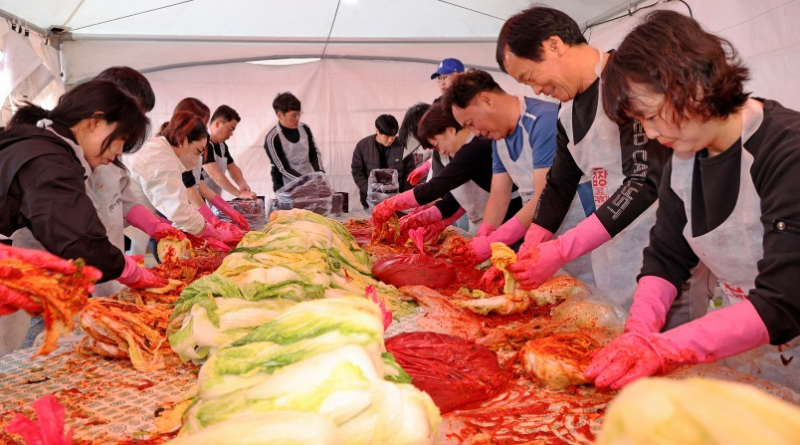Korea Elected Chair Country of Codex Processed Fruits and Vegetables Committee… Achieves Addition of “Kimchi Cabbage” to Global Kimchi Standard and Secures Approval for Global Standardization of Gim (Dried Seaweed)

South Korea has achieved significant progress in elevating the international status of its traditional foods, being elected as the chair country of the Codex Alimentarius Processed Fruits and Vegetables Committee while also securing the addition of the Korean term “kimchi cabbage” to the global kimchi standard and obtaining approval to begin global standardization work for gim (dried seaweed).
The Ministry of Agriculture, Food and Rural Affairs, the Ministry of Food and Drug Safety, the Ministry of Oceans and Fisheries, and the Korea Food Research Institute announced on the 17th that South Korea had made major achievements in strengthening the global position of its traditional agricultural and fishery products at the 48th Codex Alimentarius Commission (CODEX) meeting, held in Rome, Italy, from the 10th to the 14th.
At this year’s meeting, Korea was elected as the chair country of the Codex Processed Fruits and Vegetables Committee, with the Ministry of Food and Drug Safety to serve as committee chair. This allows Korea to take a leading role in managing and developing international standards for Korean foods such as kimchi, ginseng products, and gochujang. The new position also creates favorable conditions for promoting international standards for products widely consumed in Asia, including sweet potatoes, chestnuts, and persimmons (including hoshigaki).
Korea’s election reflects its strong global leadership in food safety, demonstrated through successfully chairing the Codex Ad Hoc Intergovernmental Task Force on Antimicrobial Resistance, the Regional Coordinating Committee for Asia, and co-chairing the Codex Committee on Food Additives. These achievements show international recognition of Korea’s efforts in global cooperation on food safety, and are expected to help Korea better respond to foreign food regulations while supporting the growth and export expansion of the K-Food industry.

Korea also succeeded in revising the international kimchi standard, which the country first proposed and was adopted in 2001. The name for the main ingredient of kimchi, previously listed only as “Chinese cabbage,” will now officially include “kimchi cabbage” and “Napa cabbage.” This change was achieved through Korea’s proactive efforts based on the increasing use of these terms in scientific literature and trade practices worldwide. The revision is expected to reinforce Korea’s status as the origin country of kimchi, strengthen the authenticity of domestically produced traditional kimchi, and support branding and export expansion.
In addition, approval was granted to launch a new global standardization project for gim (dried seaweed), which had previously been listed only under regional Asian standards. Korea strongly advocated elevating gim to a full global standard, receiving broad support from Codex member states.
With international harmonization of standards related to the quality, hygiene, labeling, and testing methods of gim, the high-value seaweed industry is expected to secure a foundation for sustainable growth. Global recognition of Korean gim will increase, and Korea’s export competitiveness will be strengthened. Streamlined compliance with varying import requirements is also expected to contribute to Korea’s goal of expanding gim exports to over 1 billion USD annually.
Ken Lowery, head of the U.S. delegation and representative of the outgoing chair country of the Processed Fruits and Vegetables Committee, congratulated Korea, noting, “Korea has extensive experience successfully leading other Codex committees, including the antimicrobial resistance task force. The United States fully supports Korea taking over the Processed Fruits and Vegetables Committee.”
Building on the achievements of this year’s Codex meeting, the Korean government plans to strengthen international cooperation to enhance global trust in K-Food products. Relevant ministries will also work closely together to ensure the smooth operation of the Processed Fruits and Vegetables Committee and the global standardization process for gim, maximizing national interest.








